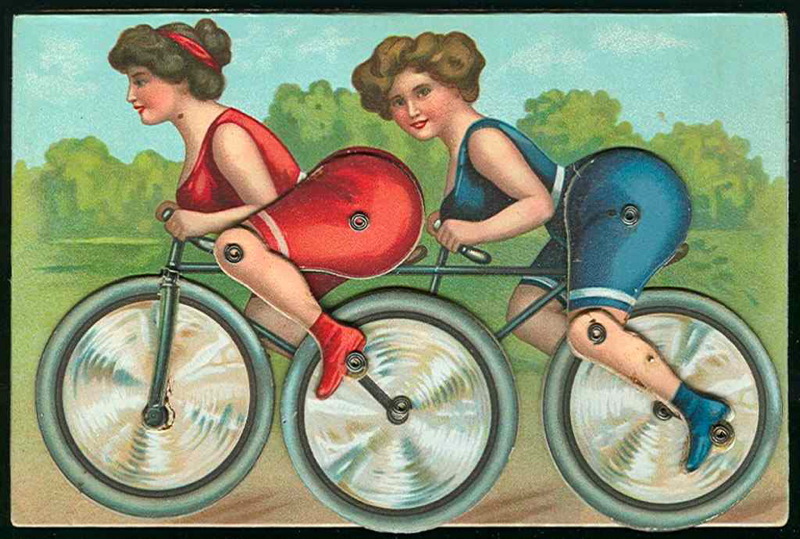
26 May Knowledge & the Backwards Bicycle
Knowledge does not equal understanding.
This quote was said by Destin after spending considerable time learning how to ride a backwards bicycle. What is a backwards bicycle? It’s a modified contraption that turns right when you rotate the handlebars to the left and vice versa. It’s akin to trying to back up a trailer hitched to a car only you are moving forward instead of reverse. Destin stated that he had the knowledge to use the backwards bicycle but did not posses the understanding to do so.
The quote bothers me. There is something about this statement that seems uninformed and incomplete. I agree philosophically with the poignant educational metaphor of re-learning how to ride a backwards bicycle. However, my perspective on this statement is that it is a more of a semantic discussion on word meaning (knowledge vs understanding). What’s really at the center of the video is the complexity of knowledge as a construct for people… or animals.
It took a German Shepherd using a toilet like a human to help me come to this realization.
Take a moment and watch both videos. Is Destin’s video of the backwards bicycle really an illustration of the differences between knowledge and understanding? Could it just be an accessible example of two common terms that people often use interchangeably when talking about learning? What about what is known about knowledge types? Maybe, just maybe, “knowledge does not equal understanding” is a statement that articulates a very obvious point.
The Backwards Brain Bicycle
The Peeing German Shepherd
Scenario: A man, Destin, re-learns how to ride a bicycle when the steering controls are reversed (turning the handles left rotates the front wheel right and vice versa). The contraption is affectionally called The Backwards Bicycle.
Scenario: A German Shepherd, Baron, demonstrates that he can use a toilet like a person. This includes lifting the seat, standing upright to urinate, and flushing the toilet. There is no affectionate name for the toilet or the process.
Problem: Destin struggles to teach himself how to ride the backwards bicycle. After 8 months of unsuccessful attempts, he is able to travel quite some distance while carefully concentrating. However, Destin’s accomplishment comes with a cost; he now has a difficult time riding a normal bicycle.
Problem: Unlike Destin, Baron can’t articulate or identify issues associated with his ability to pee standing upright. He’s a dog. Yet, I am going to make a fairly logical leap and say that Baron likely does NOT struggle to lift his leg on a tree now that he can use a toilet. I am also going to assume that he still knows that using the restroom outside is good but peeing anywhere but in a toilet inside of a house is bad.
Impressiveness: High. I have never had the opportunity to use a backwards bicycle, but I imagine doing so would be difficult if you (a) know how to ride a regular bike and (b) have spent a number of years riding. Knowing how to drive a car in reverse with an attached trailer is the most comparable activity that I can conjure with a similar degree of difficulty.
Impressiveness: There is little doubt in my mind that a German Shepherd that uses the toilet ranks high on the impressiveness meter for any person. It’s a freakin’ dog without fingers but can lift the seat with his nose! I am certain that it is difficult to teach any dog (old or young) this trick with its myriad of necessary, sequential steps.
Logic:
- Learn how to ride a bicycle.
- Ride a bicycle. Understand how to ride a bicycle.
- Learn how to ride a backwards bicycle.
- Ride a backwards bicycle. Understand how to ride a backwards bicycle.
- Incapable of riding a regular bicycle without re-learning.
Logic:
- Learn to pee outside.
- Pee outside. Understand that peeing outside is appropriate.
- Learn to pee standing upright and using a toilet.
- Pee upright using a toilet. Understand that peeing in a toilet is appropriate.
- Incapable of peeing outside without re-learning?
Types of Knowledge:
- Tacit Knowledge: Know-how that is rooted in context, experience, and practice. Difficult to communicate.
- Procedural Knowledge: Domain-specific skills, techniques, and methods. It also reflects an awareness of when to use appropriate procedures and the necessary criteria for accomplishing a task.
Types of Knowledge:
- Tacit Knowledge: Know-how that is rooted in context, experience, and practice. Difficult to communicate.
- Procedural Knowledge: Domain-specific skills, techniques, and methods. It also reflects an awareness of when to use appropriate procedures and the necessary criteria for accomplishing a task.
Activity Characteristics:
- Cognition: Mental challenge is relatively low; riding a backwards bicycle is merely executing or applying tacit/procedural knowledge.
- Feedback: Immediate feedback about success or failure. Either you are able to ride the backwards bicycle or you fall.
- Rewards: No external, motivating reinforcement. As Destin discusses, accomplishing this fete was internally guided.
- Transferability: Difficult to translate knowledge into action when a similar activity is presented (riding a backwards bike vs a regular bicycle).
- Experience: Novices gain mastery quicker due to a lack of entrenched procedural knowledge. It took less time for Destin’s son to learn how to ride the backwards bicycle.
- Neuroscience: Evidence of neuroplasticity? It feels right but I just don’t know about this claim.
Activity Characteristics:
- Cognition: A dog peeing, I assume, is not cognitively challenging once learned and practiced. Detecting bombs or drugs and distinguishing different smells seems like a more difficult activity for German Shepherds.
- Feedback: Does the pee make it into the bowl? So, yes, feedback is immediate but perhaps not internalized by a dog. A human likely needs to train the dog.
- Rewards: I suspect that an external reward and pointed feedback make this activity possible.
- Transferability: It is hard for me to surmise that Baron does not know how to pee outside after learning how to use the toilet.
- Experience: Unknown.
- Neuroscience: Unknown. There really needs to be some good, scientific research focused on dogs’ toilet training. Brain imaging is in order.
Destin’s Conclusion: Knowledge is not the same as understanding. In other words, knowledge about how to ride a backwards bicycle (moving the handlebars to the right to turn left) is different from understanding (or actually riding a backwards bicycle with some degree of success).
My Conclusion: In the case of Baron the German Shepherd, does knowledge fail to reflect an understanding? I am not so sure. In some ways, doesn’t Baron refute Destin’s claim that knowledge does not equal understanding? Isn’t it logical to assume that the dog can still pee in the backyard even though he knows how to use the toilet?
In no way is this comparison meant to decrease the relevancy or impact of the backwards bicycle. Given the number of views, Destin’s The Backwards Brain Bicycle resonates with viewers young and old. I also believe that this example gets at something important: Knowledge is different for each individual, and the types of knowledge vary widely.
However, maybe knowledge is just knowledge. Is understanding acting on knowledge? Perhaps it is a difference between nouns and verbs. Is “knowledge does not equal understanding” really a deep truth about learning or is each term a completely different construct? Maybe we should just say, “No duh, Destin. Knowledge is not the same as understanding. They mean completely different things. We only erroneously use them in everyday language which makes knowledge and understanding seem interchangeable and equal.”
- [accordionitem]
Wackystuff. (2009, March 2). Going for a Spin. Retrieved 20 May 2015, from https://flic.kr/p/64yUrr
[/accordionitem]


Sorry, the comment form is closed at this time.